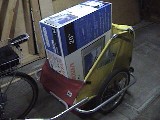 I watched Animal Planet on our new TV last night with my daughter. The infrared sensor on our old TV had pooped out. I’d lost the ability to channel surf, and with it a part of my manhood.
I watched Animal Planet on our new TV last night with my daughter. The infrared sensor on our old TV had pooped out. I’d lost the ability to channel surf, and with it a part of my manhood.
Fed up with my inability to flip, I jumped on my hybrid-electric bike, sped down the bike trail to Fred Meyers, bought the cheapest 20″ flat screen they had, loaded it into my bike trailer, and was watching commercials within an hour of having set out. The bike, the electric components on the bike, the TV, and the wind-up flashing diode lights on the bike were all made in China.
Two commercials in particular caught my attention: one for organic Sugar Frosted Mini-Wheats (about time I say) and the other for Dawn dishwashing liquid. Apparently its new and improved grease-fighting formula works great to clean crude oil off of penguins. I don’t know if commercials like this are good for the image of environmentalism. The ad execs obviously don’t think we’re all that bright.
My old 20″ TV must weigh about 80 pounds. The new one is flat screen and weighs about eight pounds. That is a ten-fold decrease in material and mass (an order of magnitude). It is an example of how we might be able to bring billions of humans out of poverty and still save our biodiversity.
Compare this technology to the old wooden console TVs of my youth and you will see that it is several orders of magnitude more environmentally friendly. And it isn’t that way out of concern for the environment. It is that way because of competition on the free market. Environmentally friendliness is a side effect, with government regulations creating level playing fields for competition (nobody can use mercury switches — game on). The same can be said for plywood, which consumes orders of magnitude less wood (with glues that meet EPA standards) and millions of other technologies out there.
My children may one day watch TV on holograms projected from devices the size of a cell phone, reducing the 300 pound television consoles of my youth down to intersections of light beams, having virtually no mass, and that’s no joke.
 I watched Animal Planet on our new TV last night with my daughter. The infrared sensor on our old TV had pooped out. I'd lost the ability to channel surf, and with it a part of my manhood.
I watched Animal Planet on our new TV last night with my daughter. The infrared sensor on our old TV had pooped out. I'd lost the ability to channel surf, and with it a part of my manhood. 
